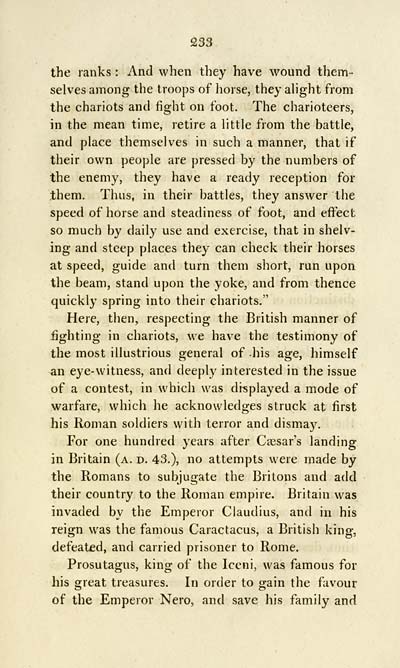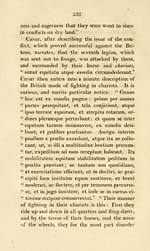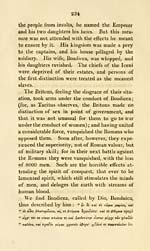Download files
Complete book:
Individual page:
Thumbnail gallery: Grid view | List view

233
the ranks : And when they have wound them-
selves among the troops of horse, they ahght from
the chariots and fight on foot. The charioteers,
in the mean time, retire a little from the battle,
and place themselves in such a manner, that if
their own people are pressed by the numbers of
the enemy, they have a ready reception for
them. Thus, in their battles, they answer the
speed of horse and steadiness of foot, and effect
so much by daily use and exercise, that in shelv-
ing and steep places they can check their horses
at speed, guide and turn them short, run upon
the beam, stand upon the yoke, and from thence
quickly spring into their chariots."
Here, then, respecting the British manner of
fighting in chariots, we have the testimony of
the most illustrious general of his age, himself
an eye-witness, and deeply interested in the issue
of a contest, in which was displayed a mode of
warfare, which he acknowledges struck at first
his Roman soldiers with terror and dismay.
For one hundred years after Caesar's landing
in Britain (a. d. 43.), no attempts were made by
the Romans to subjugate the Britons and add
their country to the Roman empire. Britain was
invaded by the Emperor Claudius, and in his
reign was the famous Caractacus, a British king,
defeated, and carried prisoner to Rome.
Prosutagus, king of the Iceni, was famous for
his great treasures. In order to gain the favour
of the Emperor Nero, and save his family and
the ranks : And when they have wound them-
selves among the troops of horse, they ahght from
the chariots and fight on foot. The charioteers,
in the mean time, retire a little from the battle,
and place themselves in such a manner, that if
their own people are pressed by the numbers of
the enemy, they have a ready reception for
them. Thus, in their battles, they answer the
speed of horse and steadiness of foot, and effect
so much by daily use and exercise, that in shelv-
ing and steep places they can check their horses
at speed, guide and turn them short, run upon
the beam, stand upon the yoke, and from thence
quickly spring into their chariots."
Here, then, respecting the British manner of
fighting in chariots, we have the testimony of
the most illustrious general of his age, himself
an eye-witness, and deeply interested in the issue
of a contest, in which was displayed a mode of
warfare, which he acknowledges struck at first
his Roman soldiers with terror and dismay.
For one hundred years after Caesar's landing
in Britain (a. d. 43.), no attempts were made by
the Romans to subjugate the Britons and add
their country to the Roman empire. Britain was
invaded by the Emperor Claudius, and in his
reign was the famous Caractacus, a British king,
defeated, and carried prisoner to Rome.
Prosutagus, king of the Iceni, was famous for
his great treasures. In order to gain the favour
of the Emperor Nero, and save his family and
Set display mode to: Large image | Transcription
Images and transcriptions on this page, including medium image downloads, may be used under the Creative Commons Attribution 4.0 International Licence unless otherwise stated. ![]()
| Early Gaelic Book Collections > Ossian Collection > Thoughts on the origin and descent of the Gael > (245) |
|---|
| Permanent URL | https://digital.nls.uk/82237384 |
|---|
| Description | Selected books from the Ossian Collection of 327 volumes, originally assembled by J. Norman Methven of Perth. Different editions and translations of James MacPherson's epic poem 'Ossian', some with a map of the 'Kingdom of Connor'. Also secondary material relating to Ossianic poetry and the Ossian controversy. |
|---|
| Description | Selected items from five 'Special and Named Printed Collections'. Includes books in Gaelic and other Celtic languages, works about the Gaels, their languages, literature, culture and history. |
|---|

